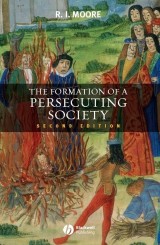Details

The Formation of a Persecuting Society
Authority and Deviance in Western Europe 950-12502. Aufl.
|
25,99 € |
|
| Verlag: | Wiley-Blackwell |
| Format: | |
| Veröffentl.: | 15.04.2008 |
| ISBN/EAN: | 9781405172424 |
| Sprache: | englisch |
| Anzahl Seiten: | 240 |
DRM-geschütztes eBook, Sie benötigen z.B. Adobe Digital Editions und eine Adobe ID zum Lesen.
Beschreibungen
The tenth to the thirteenth centuries in Europe saw the appearance of popular heresy and the establishment of the Inquisition, the expropriation and mass murder of Jews, and the propagation of elaborate measures to segregate lepers from the healthy and curtail their civil rights. These were traditionally seen as distinct and separate developments, and explained in terms of the problems which their victims presented to medieval society. In this stimulating book, first published in 1987 and now widely regarded as a a classic in medieval history, R. I. Moore argues that the coincidences in the treatment of these and other minority groups cannot be explained independently, and that all are part of a pattern of persecution which now appeared for the first time to make Europe become, as it has remained, a persecuting society. <br /> <p>In this new edition, R. I. Moore updates and extends his original argument with a new, final chapter, “A Persecuting Society”. Here and in a new preface and critical bibliography, he considers the impact of a generation’s research and refines his conception of the “persecuting society” accordingly, addressing criticisms of the first edition.</p>
Preface to the Second Edition. <p>Preface to the First Edition.</p> <p>Introduction.</p> <p>1. Persecution.</p> <p>Heretics.</p> <p>Jews.</p> <p>Lepers.</p> <p>The Common Enemy.</p> <p>2. Classification.</p> <p>3. Purity and Danger.</p> <p>4. Power and Reason.</p> <p>5. A Persecuting Society.</p> <p>Bibliographical Excursus: Debating the Persecuting Society.</p> <p>Bibliography.</p> <p>Index</p>
"One of the most influential and controversial books of medieval history of the last 20 years ... The relevance of its argument today is uncanny." <i>The Guardian</i><br /> <p>Praise for the first edition:<br /> </p> <p>"A brilliant account of medieval Europe...it is a pleasure to read an account that is so obviously of importance for our own societies, yet is conceived in a full international context." <i>Times Higher Education Supplement</i><br /> </p> <p>"A fundamental work of historical sociology, as important in its way as the works of Georges Duby and Mark Bloch...a courageous and wide-ranging thesis." <i>M. T. Clanchy, Times Literary Supplement</i></p>
<b>R. I. Moore</b>, formerly of the University of Newcastle upon Tyne, is the author of <i>The Origins of European Dissent</i> (1977), and <i>The First European Revolution, c. 970–1215</i>, (2000), in the <i>Making of Europe</i> series. He is General Editor of the <i>Blackwell History of the World</i> series and was also founding editor of the Blackwell series <i>New Perspectives</i> on the Past. He has taught at the University of Chicago and the University of California at Berkeley and is a Corresponding Fellow of the Medieval Academy of America.
The tenth to the thirteenth centuries in Europe saw the appearance of popular heresy and the establishment of the Inquisition, the expropriation and mass murder of Jews, and the propagation of elaborate measures to segregate lepers from the healthy and curtail their civil rights. These were traditionally seen as distinct and separate developments, and explained in terms of the problems which their victims presented to medieval society. In this stimulating book, first published in 1987 and now widely regarded as a a classic in medieval history, R. I. Moore argues that the coincidences in the treatment of these and other minority groups cannot be explained independently, and that all are part of a pattern of persecution which now appeared for the first time to make Europe become, as it has remained, a persecuting society. <br /> <p>In this new edition, R. I. Moore updates and extends his original argument with a new, final chapter, “A Persecuting Society”. Here and in a new preface and critical bibliography, he considers the impact of a generation’s research and refines his conception of the “persecuting society” accordingly, addressing criticisms of the first edition.</p>
"One of the most influential and controversial books of medieval history of the last 20 years ... The relevance of its argument today is uncanny." <i>The Guardian</i><br /> <p>Praise for the first edition:<br /> </p> <p>"A brilliant account of medieval Europe...it is a pleasure to read an account that is so obviously of importance for our own societies, yet is conceived in a full international context." <i>Times Higher Education Supplement</i><br /> </p> <p>"A fundamental work of historical sociology, as important in its way as the works of Georges Duby and Mark Bloch...a courageous and wide-ranging thesis." <i>M. T. Clanchy, Times Literary Supplement</i></p>


















